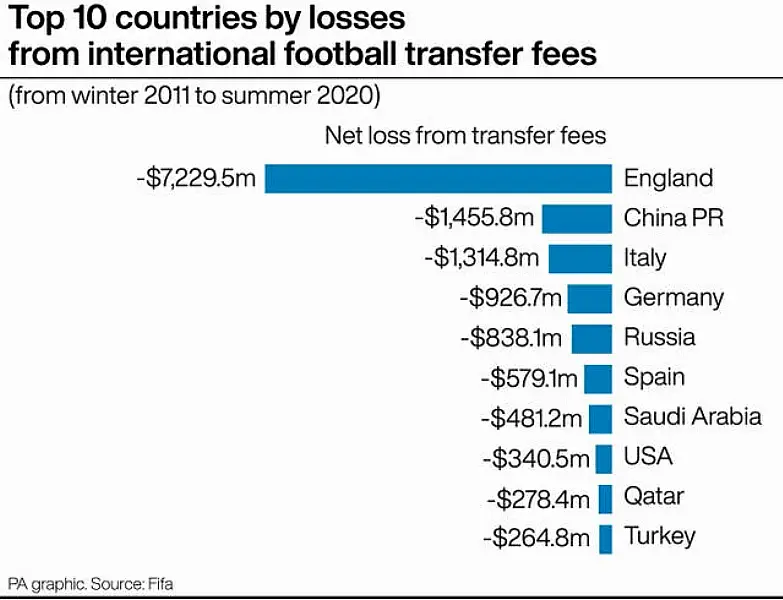English clubs made a net loss of £5.2 billion (€6 billion) on international transfers in the period between 2011 and 2020, a new report has found.
Teams in England accounted for over a quarter of international transfer expenditure in that time, with 12.4 billion US dollars (just over £9bn) spent out of a global total of 48.5bn US dollars (around £35.3bn) according to a new FIFA report.
The net loss for English clubs once transfer receipts were taken into account was 7.2bn US dollars (£5.2bn).

Manchester City may have decided to pass on Cristiano Ronaldo in the current transfer window but the FIFA report, published to mark a decade since the introduction of its transfer matching system, named them as the world’s biggest spenders on international deals.
The report does not put a figure on City’s spending but found the Blues were involved in 130 incoming international transfers, of which 59.2 per cent involved a fee. Twelve English clubs were among the 30 biggest-spending clubs in the world, with all of the top-spending sides based in Europe.
Chelsea were second, with 80 per cent of the 95 incoming international deals they conducted involving a fee according to the report.
Those 30 top-spending clubs accounted for 22.5bn US dollars of the overall spending, equating to 47 per cent.
City were 11th-highest in terms of fees received over the same period, with 44.6 per cent of their 307 outgoing international transfers and loans involving them featuring a fee.
City were involved in 232 outgoing loans or loan extensions, according to the report.
Benfica, the club which sold star defender Ruben Dias to City in the 2020 summer window, earned the most from international transfer fees, the report found.

The report said 14 deals were completed which involved a transfer fee of 100 million US dollars or more, with Argentinian winger Angel Di Maria featuring in two of them.
The average international transfer fee paid by the top 30 spending clubs peaked at 17.8m US dollars (just under £13m) in 2018, dropping to 14.4m US dollars in 2020.
FIFA’s transfer matching system (TMS) was officially launched in October 2010, and was first used for the winter 2011 transfer window.
The report also found solidarity contributions from transfers – which are paid to clubs in recognition of their role in the training and development of a player – has sharply declined, with the 2020 figure of 38.5m US dollars only just above the 38m US dollars recorded in 2011. The contributions peaked at 67.7m in 2018.
FIFA is working on establishing a Clearing House which it hopes will ensure these payments are fully and quickly distributed to the clubs and academies involved.
As solidarity contributions have declined, agents’ fees have risen steeply from 131.1m US dollars in 2011 to 640.5m in 2019. In total, 3.5bn US dollars was spent on agents’ commissions over the decade. England accounted for almost one billion dollars of that spending – 919m.







